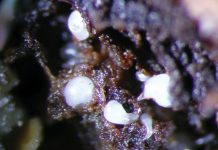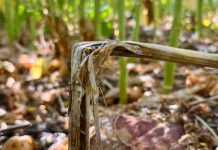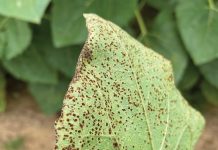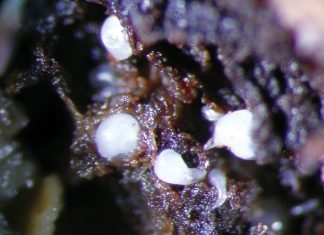A number of acts and regulations in South Africa regulate various aspects regarding the importation, propagation, stocking, denomination and sale of seed and plants and propagating material. These include the Plant Breeders’ Rights Act, the Plant Improvement Act, the Genetically Modified Organisms Act, the Agricultural Pests Act, and the Biodiversity Act.
South Africa is a signatory to the International Union for the Protection of New Varieties of Plants (UPOV) which provides guidelines on the protection of plant breeders’ rights globally.
Plant breeders and researchers focus their efforts on providing solutions to producers to increase yields, meet nutritional demands and to feed the growing world population while adapting to or fighting climate change. New varieties enable producers to produce more using fewer resources, or to comply with consumer requirements.
‘Plant breeders foster innovation while addressing prevailing and future agricultural challenges. It is important to realise that if there were no breeding activities, there would be very little progress and the agricultural sector would stagnate. There must be an incentive for breeders or companies to continue investing time, efforts, and money in breeding programmes so that we can be assured of having new varieties that will enable future production and progress,’ says Dr Lukeshni Chetty, general manager of the South African National Seed Organisation (SANSOR).
Protecting plant breeders’ rights is important for the following reasons:
- Plant breeders’ rights provide incentives for plant breeders to invest in the development of new plant varieties. This is essential for advancements in crop production, and agriculture in general.
- Plant breeding plays a vital role in sustainability. New varieties that are more resilient, productive, and adaptable are needed to meet the challenges of changing climatic conditions and a growing population.
- Developing new plant varieties requires a significant amount of time and resources. By protecting plant breeders’ rights, breeders and researchers are allowed to recoup a portion of their investment by granting them exclusive rights to commercialise their varieties for a certain period of time.
- Plant breeders’ rights protect breeders from exploitation.
Illegal seed practices affect not only plant breeders’ rights, but also the advancement of crops, the value of seed, and the quality of the end product.
It is crucial that all role-players in the seed industry know what is stated in the laws governing the seed industry and that they comply to these regulations, says Kobus van Huyssteen, technical manager at SANSOR.
Plant Breeders’ Rights Act
The Plant Breeders’ Rights Act (Act No. 15 of 1976) intends to provide a system under which new varieties of certain kinds of plants may be registered. It also allows for the protection of these granted rights as well as making provision for the granting of licences in respect of exercising these rights. In essence, the act grants breeders of new plant varieties protection against exploitation without their permission.
In terms of the act the protection afforded to the holder of a plant breeder’s right includes that prior authorisation must be obtained from the holder for the duration of the right (20 years for seed crops), for any person intending to undertake:
- the production or reproduction (multiplication) of the protected variety;
- the conditioning (cleaning, treating, or adding value) for the purposes of propagation of the protected variety;
- the sale, exchange or any other form of marketing or advertising of the protected variety;
- the exporting of the protected variety;
- the importing of the protected variety; or
- the stocking of the protected variety for any of the purposes referred to in paragraphs (1) to (5).
To encourage plant breeding, plant breeders must be assured of a return on investment. Intellectual property right (IPR) protection allows companies to generate a return on research and development investment. Strong intellectual property protection allows breeders to be rewarded for their efforts.
The costs incurred in research and development of new plant varieties and hybrids are long-term investments and require significant amounts of financial resources. In order to justify the size and scope of research spending necessary to develop new varieties, breeders or companies must be able to recoup their original investment as well as make earnings on it.
In South Africa, the implementation of a plant breeders’ rights system has been a major stimulus for the plant breeding industry. Through the protection of intellectual property rights, the seed industry has been able to provide agriculture with a diverse choice of higher-yielding, more disease-resistant, and hardier varieties.
Intellectual property rights ensure that innovation takes place by encouraging plant breeders to breed improved varieties that focus on bringing economic, environmental and health benefits to the market. Plant breeders’ rights give breeders exclusive control over the propagating material (including seed, cuttings, divisions, and tissue culture) and harvested material (cut flowers, fruit, foliage) of a new variety for a number of years.
With these rights, the breeder can choose to become the exclusive marketer of the variety, or to license the variety to others. In order to qualify for these exclusive rights, a variety must be new, distinct, uniform, and stable. The breeder must also give the variety an acceptable ‘denomination’, which becomes its generic name and must be used by anyone who markets the variety.
These rights also enable plant breeders and producers to get access to high-quality new varieties produced globally. Plant breeders of varieties will not supply propagating material to individuals, if such material cannot be protected by plant breeders’ rights. It is of the utmost importance for the economy to obtain new and improved plant varieties as there is a constant demand for better quality, higher yields, better processing properties, as well as increased disease, pest and drought resistance.
If any person other than the seed companies performs any of the above acts on protected varieties without authorisation of a specific seed company/owner of the right, it means that they are infringing the proprietor’s rights in terms of the Plant Breeders’ Rights Act. For example, any person who cleans (conditions), markets, or sells propagating material (seed) of the protected varieties, or any person who plants a crop using unauthorised seed and harvests or any person who sells the harvest, also infringes the rights issued in respect of the new variety in terms of the act.
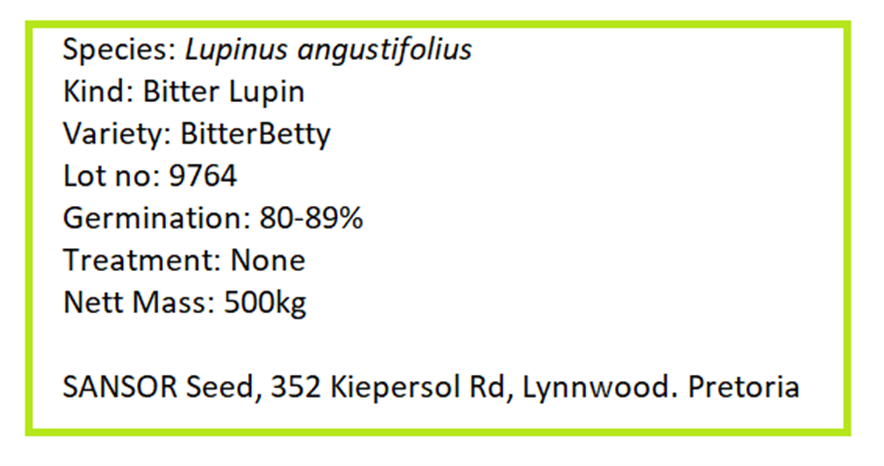
Plant Improvement Act
In addition to plant breeders’ rights, plant improvement covers a broad range of activities, including trade, certification, variety registration, cleaning, packaging, and quality testing of plant propagating material. All these activities are governed under the South African Plant Improvement Act (Act No. 53 of 1976).
This act’s goal is to regulate the sale and cultivation of certain declared plants and propagating material. The act provides for the registration of establishments from which the sale of certain plants or the processing, packaging and sale of these propagating material may be undertaken. It also prescribes conditions under which such plants or propagating material may be sold for cultivation purposes.
It aims to protect the producer and seller by setting minimum standards, and to maintain the quality of certain plants and propagating material and ensure the usefulness of these products for agricultural and industrial purposes. It also controls the import and export of certain plants and propagating material.
In terms of Section 6 of the Plant Improvement Act, business may only be conducted on premises which have been registered in terms of the act. The act defines ‘business’ as the cleansing of propagating material (seed) for sale; the prepacking of propagating material for sale; and the sale of propagating material.
In terms of Section 13 of the act, propagating material (seed) shall only be sold for purposes of cultivation under the denomination (name) entered in respect thereof in the varietal list if the propagating material complies with the requirements prescribed in respect thereof; and if, in the case of propagating material (seed), the material is pre-packaged or is packed in containers which comply with the prescribed requirements and are sealed and branded, marked or labelled in the prescribed manner with the prescribed information. These requirements include physical purity and germination, absence of prohibited weed seeds, and the trueness to variety.
Seed companies also have certain requirements that they have to adhere to according to regulation 10 under the act.
The owner or occupier of an establishment at which the business of the cleansing of propagating material for sale is conducted shall, in respect of all seed handled there, keep complete records of:
- the date on which the seed concerned was received;
- the kind and variety of the seed concerned;
- the name and address of the person from whom the seed concerned was received;
- the total mass of the seed concerned and the number of containers in which it was held;
- the total mass of the cleansed seed and the number of containers in which it was held;
- the lot number of the cleansed seed, and if such seed was certified after cleansing, also the number of the certificate issued in respect thereof;
- the names and addresses of the persons to whom the cleansed seed was supplied;
- the mass of cleansed seed which was supplied to each such person; and
- the dates on which the cleansed seed was so supplied.
In terms of Regulation 11 and 12 under the act, the owner or occupier of an establishment at which the business of the prepacking of propagating material for sale is conducted shall, in respect of each lot of propagating material handled there, keep complete records of the following:
- the date on which the lot concerned was received;
- the kind and variety of the propagating material in the lot concerned, provided that, in the case of a mixture, the names of the kinds and varieties presented therein, as well as the percentage contents of each, shall be recorded;
- the name and address of the person from whom the lot concerned was received;
- the total mass or number of units of the propagating material in the lot concerned;
- the lot number of the lot concerned;
- the number of the certificate issued in respect of the propagating material in the lot concerned if that propagating material was certified; and
- the date on which prepacking of the lot concerned was completed.
In terms of Regulation 36 under the act, seed in containers which is not certified or prepacked, shall be marked in clearly legible symbols, letters, and figures with, or be furnished with a label with the following information:
- the name, as indicated in a notice under Section 2 of the act, of the kind of plant (botanical name) to which such seed belongs;
- the denomination of the variety to which such seed belongs the lot number of the seed;
- the words ‘Percentage Germination’ or ‘Percentage Viability’, where applicable, followed by the group within which the actual percentage germination or the actual percentage viability, where applicable, of such seed falls under the name and address of the establishment where such seed is sold, provided that where such seed is resold, the name and address of the establishment from which it was obtained, may also, or instead thereof, be indicated.
According to At van Rooy, patent attorney and chairman of the board of KISCH IP, the consequences of contravention of the Plant Breeders’ Act or the Plant Improvement Act and Regulations should not be taken lightly. ‘Any person who conducts an unregistered business or sells propagating material unlawfully can be found to be guilty of a criminal offence and liable on conviction to a fine and/or imprisonment and could be found to infringe registered plant breeders’ rights, carrying a minimum statutory fine of R10 000 (or actual damages) per variety infringed,’ he points out.
While government has the primary oversight and responsibility to ensure plant improvement is regulated, it is ultimately the responsibility of all role-players to ensure that the regulations are adhered to so that individual growers, agricultural bodies, and the agricultural sector at large benefit from a robust industry built on high-quality crops, continued innovation, and improved varieties.



